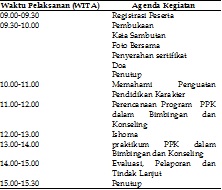Workshop Penguatan Pendidikan Karakter bagi Guru Bimbingan dan Konseling SMP Workshop on Strengthening Character Education for Junior High School Guidance and Counseling Teachers
Main Article Content
Abstract
Guidance and Counseling Workshop on Strengthening Character Education in Guidance and Counseling Services for Junior Secondary Guidance and Counseling Teachers in Tabalong Regency was carried out to prepare guidance and counseling teachers who were capable of implementing guidance and counseling services in strengthening character education based on operational guidance and counseling in schools, by the Guidance and Counseling Guidelines for Primary and Secondary Education issued by the Ministry of Education and Culture. The workshop was held one day, namely on August 26, 2019, with 37 participants. Technically, the implementation of the workshop takes place in 5 stages of activities, namely registration; lectures; sharing experiences; and questions and answers practicum. Resource persons for the workshop activities were lecturers in the guidance and counseling study program. Based on the implementation of this service, it can be concluded that guidance and counseling teachers have an essential role in strengthening character education by using guidance and counseling services based on the Operational Guidance and Counseling Implementation Guidelines. Therefore, it is suggested to be followed up into technical guidance activities in implementing guidance and counseling services with a more specific activity agenda; and become a preliminary study in making guidance and counseling service modules for strengthening character education based on Operational Guidance for Guidance and Counseling Implementation.
Downloads
Article Details
Authors who publish with this journal agree to the following terms:
- Any article on the copyright is retained by the author(s).
- Author grant the journal, right of first publication with the work simultaneously licensed under a Creative Commons Attribution License that allows others to share work with acknowledgment of the work authors and initial publications in this journal.
- Authors are able to enter into a separate, additional contractual arrangements for non-exclusive distribution of published articles of work (eg, post-institutional repository) or publish it in a book, with acknowledgment of its initial publication in this journal.
- Authors are permitted and encouraged to post their work online (e.g., in institutional repositories or on their websites) prior to and during the submission process, as can lead to productive exchanges, as well as earlier and greater citation of published work.
- The article and any associated published material is distributed under the Creative Commons Attribution-ShareAlike 4.0 International License
References
Jalal. F. 2010. Kebijakan Nasional Pendidikan Karakter: Tiga Stream Pendekatan. Jakarta: Kementerian Pendidikan Nasional
Kristiawan, M. 2016. Telaah Revolusi Mental Dan Pendidikan Karakter Dalam Pembentukkan Sumber Daya Manusia Indonesia Yang Pandai Dan Berakhlak Mulia. Ta'dib. 18(1):13-25. http://dx.doi.org/10.31958/jt.v18i1.274
Kristiawan, M. 2015. A Model of Educational Character in High School Al-Istiqamah Simpang Empat, West Pasaman, West Sumatera. Research Journal of Education. 1(2):15-20.
Lickona, T. 1994. Raising Good Children: Helping Your Child Through the Stage of Moral Development. New York: Bantam Books
Mahmudi, I. 2013. Pembentukan Karakter Melalui Layanan Bimbingan Dan Konseling Islami. COUNSELLIA : Jurnal Bimbingan dan Konseling. 3(1):1-15. http://doi.org/10.25273/counsellia.v3i1.238
Marjohan. 2014. Hubungan Keteladanan Orang Tua terhadap Perilaku Sosial Siswa. Jurnal Ilmiah PPKn IKIP Veteran Semarang. 2(1):14-23.
Maunah, B. 2015. Implementasi Pendidikan Karakter Dalam Pembentukan Kepribadian Holistik Siswa. Jurnal Pendidikan Karakter. 5(1):90-101. https://doi.org/10.21831/jpk.v0i1.8615
Meggit, C. 2013. Memahami Perkembangan Anak. Jakarta: PT Indeks
Menteri Pendidikan Nasional. 2010. Penerapan Pendidikan Karakter Dimulai di SD. https://www.antaranews.com/berita/186928/mendiknas-penerapan-pendidikan-karakter-dimulai-sd
Phillips, S. 2008. Refleksi Karakter Bunga Bangsa. Jakarta: Bumi Aksara
Pratama, E.D. 2018. Pelaksanaan Penguatan Pendidikan Karakter Di SMK Negeri 2 Pengasih. Jurnal Pendidikan Vokasi Otomotif. 23(1):11-26.
Safitri, N.M. 2015. Implementasi Pendidikan Karakter Melalui Kultur Sekolah Di SMP N 14 Yogyakarta. Jurnal Pendidikan Karakter. 5(2):173-183. https://doi.org/10.21831/jpk.v0i2.8621
Susilo, A., Sarkowi, S. 2018. Peran Guru Sejarah Abad 21 dalam Menghadapi Tantangan Arus Globalisasi. Historia: Jurnal Pendidik dan Peneliti Sejarah. 2(1):43-50. https://doi.org/10.17509/historia.v2i1.11206
